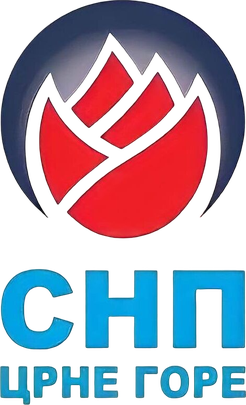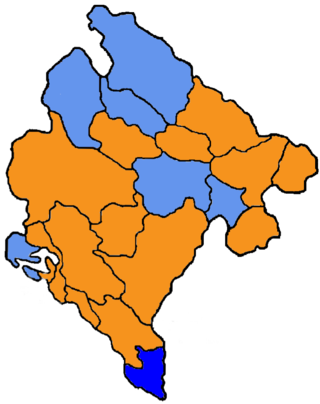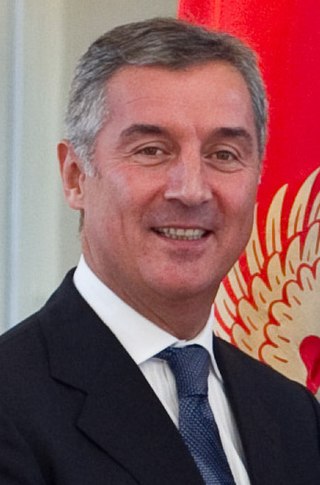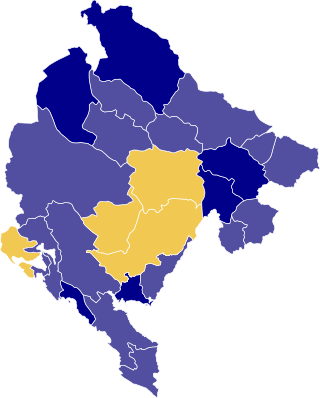| |||||||||||||||||||||||||||||||||
| |||||||||||||||||||||||||||||||||
 Mayoral seats | |||||||||||||||||||||||||||||||||
Montenegrin municipal elections were held in all 23 municipalities, between March 2012 and May 2014.
| |||||||||||||||||||||||||||||||||
| |||||||||||||||||||||||||||||||||
 Mayoral seats | |||||||||||||||||||||||||||||||||
Montenegrin municipal elections were held in all 23 municipalities, between March 2012 and May 2014.
| Party | Votes | % | Seats [1] |
|---|---|---|---|
| Coalition for European Podgorica | 49.146 | 47.2% | 29 |
| Democratic Front | 30.002 | 27.6% | 17 |
| Socialist People's Party | 14.776 | 14.9% | 8 |
| SDP-Positive Montenegro | 9.454 | 8.8% | 5 |
| Albanian Coalition | 1.242 | 0.8% | 0 |
| Party | Percentage | Seats [3] |
|---|---|---|
| Coalition for European Montenegro | 51.7% | 23 |
| Democratic Front | 31.2% | 13 |
| Socialist People's Party | 8.5% | 3 |
| Positive Montenegro | 6.6% | 2 |
Elected mayor - Veselin Grbović (European Montenegro - Positive)
| Party | Percentage | Seats [4] |
|---|---|---|
| Democratic Party of Socialists | 35.6% | 13 |
| The Choice - Local Group of Citizens | 24.9% | 9 |
| Let's Save Herceg Novi - SNP, DF | 23.3% | 8 |
| Novi List | 5.3% | 2 |
| Social Democratic Party | 5.2% | 2 |
| Liberal Party | 0.95% | 0 |
Turnout - 68.2% Elected mayor - Nikša Gojković (The Choice - DPS coalition)
At elections in the rest of municipalities ruling DPS stay in power in most municipalities. It held an absolute majority in Bar, Žabljak, Budva and Bijelo Polje, formed ruling coalitions with SDP in Danilovgrad, Pljevlja, Andrijevica, Šavnik, Tivat, Cetinje, Kotor and Mojkovac and with Bosniak Party in Plav, Rožaje, Petnjica and Gusinje, and in Herceg Novi, where DPS-SDP coalition formed majority with local parties. [5] The opposition won only in Plužine, where the local SNP won absolute power, in Berane, where the opposition formed a joint coalition at the local level and in Kolašin where SDP form an post-election coalition with opposition to form local government. While in Ulcinj, the local government formed the Albanian minority parties.
The Democratic Party of Socialists of Montenegro is a social-democratic and populist political party in Montenegro. A former long-time ruling party sitting at the opposition for the first time since 2020, it was formed on 22 June 1991 as the successor of the League of Communists of Montenegro, which had governed Montenegro within the Socialist Federal Republic of Yugoslavia since World War II, and has remained a major force in the country ever since. The party is a member of the Socialist International and the Progressive Alliance, and an associate of the Party of European Socialists. During the 1990s, DPS was the major centre-left, social-democratic party in favour of Serbian–Montenegrin unionism. However, since 1997, the party has embraced Montenegrin independence and has been improving ties with the West, slowly turning into a catch-all party embracing Atlanticism, Montenegrin nationalism, neoliberalism, and pro-Europeanism.

The Socialist People's Party of Montenegro is a political party in Montenegro. It is a social-democratic and socially conservative party, that is positioned on the centre-left on the political spectrum with regard to economic matters. It is supportive of accession of Montenegro to the European Union, and was historically supportive of Serbian–Montenegrin unionism.

Miomir Mugoša is a Montenegrin physician and politician. He has been the longest-serving mayor of Podgorica, the capital of Montenegro, from 2000 to 2014. He also served as the president of FK Budućnost Podgorica, main soccer team in Podgorica.

The Democratic Front was a right-wing populist and socially conservative political alliance in Montenegro. It was composed of the New Serb Democracy, Movement for Changes and Democratic People's Party, with some other minor parties as the alliance's partners at the local level, while United Montenegro and Workers' Party were external members of the Democratic Front parliamentary group. The alliance was formed mainly to overthrow the Democratic Party of Socialists, the party in power from the introduction of the multi-party system until the 2020 parliamentary election.

Parliamentary elections were held in Montenegro on 16 October 2016. The ruling Democratic Party of Socialists (DPS) remained the largest party, winning 36 of the 81 seats, and subsequently formed a coalition government with the new Social Democrats and national minority parties. The elections were held in the midst of an alleged coup d'état attempt.

Parliamentary elections were held in Montenegro on 30 August 2020. They were the fifth parliamentary in Montenegro since gaining its independence in 2006. Eighty-one members of the Montenegrin parliament were elected. Elections were organized in special conditions, due to the COVID-19 pandemic in Montenegro. The parliamentary election was also held simultaneously with the local elections in five municipalities.

Democratic Montenegro, also known as the Democrats, is a conservative liberal, centrist, populist and pro-European political party in Montenegro. Democrats currently has nine MPs in the Parliament of Montenegro, elected in 2020, from the big tent Peace is Our Nation (MNN) electoral list. Its founder and current leader is Aleksa Bečić, former President of the Parliament.

In Montenegro, the Opposition is all of the political parties represented in Parliament that are not a part of the Government supported by the parliamentary majority.

Presidential elections were held in Montenegro on 15 April 2018. Former Prime Minister Milo Đukanović, leader of the ruling DPS was elected as new President of Montenegro in the first round.
City Assembly elections were held in Podgorica, the capital of Montenegro, on 27 May 2018. Parties and coalitions ran for 61 seats in the Assembly, with 3% election threshold required to win seats.

Montenegrin municipal elections were held in all 21 municipalities, between June 2004 and October 2006. It resulted in the victory of the ruling DPS-SDP coalition in 15 out of 21 municipalities, where they secured a majority, alone or in a coalition with national minority parties.

Montenegrin municipal elections were held in all 21 municipalities, between April 2004 and October 2006. It resulted in the decisive victory of the ruling Coalition for European Montenegro in 18 out of 21 municipalities, where he has secured a majority, on its own or in a coalition with national minority parties.
Municipal elections were held in Capital City of Podgorica and eleven other municipalities of Montenegro on 25 May 2014.

The Marković Cabinet was the 41st cabinet of Montenegro. It was led by Prime Minister Duško Marković. It was elected on 28 November 2016 by a majority vote in the Parliament of Montenegro. The coalition government was composed of the Democratic Party of Socialists, the Social Democrats, and ethnic minority parties. The cabinet lasted until 4 December 2020, when it was succeeded by the Krivokapić Cabinet, and was the last cabinet of the era of DPS dominance, which lasted from the introduction of the multi-party system in SR Montenegro.

The sixth cabinet of Milo Đukanović was the cabinet of Montenegro from 4 December 2012 to 28 November 2016. It was a coalition government composed of centre-left Coalition for a European Montenegro and national minority parties. Split in the ruling DPS-SDP coalition in January 2016, leaving the government functioning as a de facto minority government. The Cabinet was functioning as the provisional government , from 12 May to 28 November 2016, with several Ministers from opposition parties joined the government.
In February 2019, protests began in Montenegro against President Milo Đukanović, Prime Minister Duško Marković, and the government led by the ruling Democratic Party of Socialists (DPS), which has been in power since the introduction of multi-party system in 1990.
Local elections were held on 14 March 2021 in Nikšić Municipality, on 9 May 2021 in Herceg Novi Municipality, while the elections in the municipalities of Cetinje, Mojkovac and Petnjica were held on 5 December 2021.

Presidential elections were held in Montenegro on 19 March 2023. Long-ruling incumbent president Milo Đukanović was eligible for re-election. Since no candidate received a majority of the vote, a second round vote was held on 2 April. In the first round, Đukanović, leader of the populist DPS, received 35%, coming first. Jakov Milatović, candidate of the newly formed centrist Europe Now! movement, running on an anti-corruption platform, outperformed the polls, gaining 29% of the votes and faced Đukanović in the second round. Andrija Mandić, one of the leaders of the right-wing populist DF secured 19% of the votes, finishing third in the first round. The second round runoff resulted in Milatović defeating Milo Đukanović in a landslide, becoming the first elected president not being a member of the Đukanović's DPS since introduction of the multi-party system in 1990, winning roughly 60% of the popular vote. It was the first time a runoff vote was held since the 1997 election, making it first presidential runoff since Montenegro gained independence in 2006, also the first election since 1997 where an incumbent president actively seeking reelection was denied a second term.

The Europe Now Movement, sometimes stylised with an exclamation mark, is a centrist political organization in Montenegro, founded in June 2022 by the former Ministers of Finance and the Economy, Milojko Spajić and Jakov Milatović, respectively. It describes itself as an economy-focused and anti-corruption movement, that is economically liberal.
On 23 October 2022, elections were held to elect members of the City Assembly of Podgorica, the capital of Montenegro. Eight parties or coalitions contested for 58 seats, with a 3% vote threshold required to win seats.